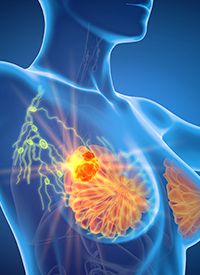Liquid Nitrogen–Based Cryoablation Leads to High RFS Rate in Low-Risk, Early-Stage Breast Cancer
Liquid nitrogen–based cryoablation elicited a 5-year local RFS rate of 96.39% in patients with low-risk, early-stage breast cancer.
Image Credit: stock.adobe.com

Liquid nitrogen–based cryoablation (ProSense®) elicited a 5-year local recurrence-free survival (RFS) rate of 96.39% (n = 187/194) in patients with low-risk, early-stage breast cancer, according to topline data from the Ice3 trial (NCT02200705) released by IceCure Medical.1
The analysis occurred following the 5-year follow-up of the last patient treated on Ice3. Notably, patients who were local recurrence free did not have significant device-related adverse effects (AEs) or complications.
According to IceCure Medical, liquid nitrogen–based cryoablation could represent a safe and effective alternative to lumpectomy for patients with early-stage breast cancer. After completing the analysis and evaluation of the full data set, the company expects to submit results to the FDA in April 2024.
"We are very pleased with this topline outcome and believe these results demonstrate a highly favorable safety and efficacy profile that positions ProSense as a desirable alternative to lumpectomy for early-stage breast cancer. Having completed the study on schedule, we are now compiling the full data set which we plan to submit to the FDA next month for marketing clearance," Eyal Shamir, chief executive officer of IceCure, stated in a news release. "While the FDA evaluates the data, we are optimistic their upcoming decision will give women in the United Stated the same access as those who are already benefitting from ProSense in other countries."
The ProSense cryoablation system is a minimally invasive treatment option intended to destroy tumors by freezing them via liquid nitrogen to create large, lethal zones for maximum efficacy in tumor destruction in benign and cancerous lesions of the breast, kidney, lung, and liver.
Previously reported data from a 3-year interim analysis of Ice3 showed that at a median follow-up of 34.83 months, the ipsilateral breast tumor recurrence (IBTR) rate was 2.06% (n = 4/194). Mild AEs were reported in 18.4% of patients, and 2.4% of patients experienced moderate AEs.2
The prospective, multicenter, single-arm, non-randomized trial enrolled female patients 50 years of age or older with unifocal, ultrasound-visible invasive ductal carcinoma that was 1.5 cm or smaller and classified as low to intermediate grade. Patients needed to have hormone receptor (HR)–positive, HER2-negative disease.2,3
Key exclusion criteria included lobular carcinoma; luminal B pathology; a Nottingham score of 3; microinvasion or invasive breast carcinoma with extensive intraductal component; multifocal and/or multicentric in breast cancer; multifocal calcifications; prior or concurrent neoadjuvant chemotherapy for breast cancer; and HR-negative, HER2-positive disease.3
All enrolled patients received liquid nitrogen–based cryoablation. The 5-year IBTR rate served as the trials’ primary end point, and secondary end points included complete ablation of primary tumor up to 60 months after cryoablation; quality of life; breast cosmetics satisfaction; regional recurrence rate; distant metastases rate; disease-free survival; overall survival; breast cancer survival; and safety.
References
- IceCure Medical reports positive topline results from ICE3 cryoablation breast cancer study: achievement of 96.39% recurrence free rate brings company one step closer to providing women a non-surgical alternative to lumpectomy. News release. IceCure Medical. March 19, 2024. Accessed March 19, 2024. https://ir.icecure-medical.com/news-events/press-releases/detail/121/icecure-medical-reports-positive-topline-results-from-ice3-cryoablation-breast-cancer-study-achievement-of-96-39-recurrence-free-rate-brings-company-one-step-closer-to-providing-women-a-non-surgical-alternative-to-lumpectomy
- Fine RE, Gilmore RC, Dietz JR, et al. Cryoablation without excision for low-risk early-stage breast cancer: 3-Year interim analysis of ipsilateral breast tumor recurrence in the ICE3 trial. Ann Surg Oncol. 2021;28(10):5525-5534. doi:10.1245/s10434-021-10501-4
- Cryoablation of low risk small breast cancer- Ice3 trial. ClinicalTrials.gov. Updated February 14, 2024. Accessed March 19, 2024. https://clinicaltrials.gov/study/NCT02200705



